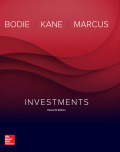
a.
To calculate: Percentage increase in the net worth of the brokerage account.
Introduction: A brokerage account refers to an investment account that allows the account holder to deposit money and execute the trade in the place of the customer.
a.
Answer to Problem 11PS
Percentage change in net worth if price changes to $22 is 13.33%
Percentage change in net worth if price changes to $20 is 0%
Percentage change in net worth if price changes to $18 is -13.33%
Explanation of Solution
Given Information:
Selling price per share: $20
Number of shares: 1,000
Initial investment: $15,000
If share price of X changes to $22
If share price of X changes to $20
If share price of X changes to $18
Working Notes:
Calculation of current net worth:
b.
To calculate: The price at which the margin call will be generated.
Introduction: A margin call occurs when an investor’s account has fallen below the maintenance margin requirement, and then the margin call occurs.
b.
Answer to Problem 11PS
Margin call will be generated when the price is $13.33 or lower.
Explanation of Solution
Given Information:
Maintenance margin: 25%
Computing the price at which margin call will be generated:
Price is denoted by P
The total value of shares is 1000P
The chances of getting a margin call increases when the equity of business gets decreased.
c.
To calculate: The price at which margin call will be generated.
Introduction: When an investor’s account has reduced to a certain amount which is equal to or less than the account’s maintenance margin, then the margin call occurs.
c.
Answer to Problem 11PS
Margin call will be generated when price is $13.33 or lower.
Explanation of Solution
Given,
Initial investment: $10,000
The total value of shares is 1,000P, (Here P denotes the price)
Now, the money of your own is reduced to $10,000 which means the borrowed amount is increased to $10,000.
d.
To calculate: The
Introduction: The
d.
Answer to Problem 11PS
Return over the price if a price change to $22 is 10.67%
Return over the price if price changes to $20 is -2.67%
Return over the price if price changes to $18 is -16%
Explanation of Solution
Given Information:
Number of shares: 1,000
Initial investment: $15,000
Return over the price if Price of X changes to $22
Return over the price would be 10.67%
Return over the price if Price of X changes to $20
Return over the price would be -2.67%
Return over the price if Price of X changes to $18
Return over the price would be -16%
e.
To calculate:The price at which margin call occurs after year passed.
Introduction: When an investor’s account arrives at a point where the initial margin deposit is equal to or less than the loss, which reduces the initial margin then the margin call occurs.
e.
Answer to Problem 11PS
Lowest Price fall before margin call is $7.2
Explanation of Solution
Calculating margin ratio:
Want to see more full solutions like this?
- AP Associates needs to raise $35 million. The investment banking firm of Squeaks, Emmie, andChippy will handle the transaction.a. If stock is used, 1,800,000 shares will be sold to the public at $21.30 per share. The corporation willreceive a net price of $20 per share. What is the percentage underwriting spread per share?b. If bonds are utilized, slightly over 37,500 bonds will be sold to the public at $1,000 per bond. Thecorporation will receive a net price of $980 per bond. What is the percentage of underwritingspread per bond? (Relate the dollar spread to the public price.)c. Which alternative has the larger percentage of spread?arrow_forwardGracie’s Dog Vests currently has 5,200,000 shares of stock outstanding and will report earnings of$8.8 million in the current year. The company is considering the issuance of 1,500,000 additionalshares that will net $28 per share to the corporation.a. What is the immediate dilution potential for this new stock issue?b. Assume that Grace’s Dog Vests can earn 8 percent on the proceeds of the stock issue in time toinclude them in the current year’s results. Calculate earnings per share. Should the new issuebe undertaken based on earnings per share?arrow_forwardYou plan to contribute seven payments of $2,000 a year, with the first payment made today (beginning of year 0) and the final payment made at the beginning of year 6, earning 11% annually. How much will you have after 6 years? a. $12,000 b.$21,718 c.$19,567 d.$3,741arrow_forward
 Essentials Of InvestmentsFinanceISBN:9781260013924Author:Bodie, Zvi, Kane, Alex, MARCUS, Alan J.Publisher:Mcgraw-hill Education,
Essentials Of InvestmentsFinanceISBN:9781260013924Author:Bodie, Zvi, Kane, Alex, MARCUS, Alan J.Publisher:Mcgraw-hill Education,

 Foundations Of FinanceFinanceISBN:9780134897264Author:KEOWN, Arthur J., Martin, John D., PETTY, J. WilliamPublisher:Pearson,
Foundations Of FinanceFinanceISBN:9780134897264Author:KEOWN, Arthur J., Martin, John D., PETTY, J. WilliamPublisher:Pearson, Fundamentals of Financial Management (MindTap Cou...FinanceISBN:9781337395250Author:Eugene F. Brigham, Joel F. HoustonPublisher:Cengage Learning
Fundamentals of Financial Management (MindTap Cou...FinanceISBN:9781337395250Author:Eugene F. Brigham, Joel F. HoustonPublisher:Cengage Learning Corporate Finance (The Mcgraw-hill/Irwin Series i...FinanceISBN:9780077861759Author:Stephen A. Ross Franco Modigliani Professor of Financial Economics Professor, Randolph W Westerfield Robert R. Dockson Deans Chair in Bus. Admin., Jeffrey Jaffe, Bradford D Jordan ProfessorPublisher:McGraw-Hill Education
Corporate Finance (The Mcgraw-hill/Irwin Series i...FinanceISBN:9780077861759Author:Stephen A. Ross Franco Modigliani Professor of Financial Economics Professor, Randolph W Westerfield Robert R. Dockson Deans Chair in Bus. Admin., Jeffrey Jaffe, Bradford D Jordan ProfessorPublisher:McGraw-Hill Education





